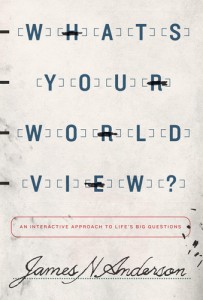 A review of What’s your Worldview? by James N. Anderson.
A review of What’s your Worldview? by James N. Anderson.
The word “worldview” is an elusive beast. Even as you describe it, you can practically hear the sound of people’s eyes glazing over. It’s essentially the underlying framework of beliefs, assumptions and philosophies (glaze) that help us navigate the world and it’s (glazing) vitally important to think about for any Christian who relates to non-Christians in any way (and … glazed).
But if you have a moment to unglaze your eyes, it really is important. Let’s say you begin to talk about the gospel with a non-Christian friend. It’s going well, until you say “That’s why I believe that Jesus is the only way to God,” to which ![]() your friend says, “Yes – Jesus is one of the ways to God. Everyone has their own way.” What you say at that point – that’s the stuff of worldview. And in order to be able to have those conversations, you’re going to need to identify worldviews, but also have some insight into how worldviews can change.
your friend says, “Yes – Jesus is one of the ways to God. Everyone has their own way.” What you say at that point – that’s the stuff of worldview. And in order to be able to have those conversations, you’re going to need to identify worldviews, but also have some insight into how worldviews can change.
Here’s a sentence I didn’t think I’d ever write: What’s your Worldview? is, as far as I’m aware, the first book of theology that takes the form of a Choose Your Own Adventure book. For those of you who are not children of the 80s and 90s, the CYOA book takes a traditional narrative and twists it, such that a page will present you with a choice, (“If you wish to fight the bear, turn to page 33. If you wish to throw perfume at the bear, turn to page 78.”) at which point the narrative forks and then forks again with each subsequent choice, offering multiple paths through the book, some more successful than others.
In a playful way, What’s your Worldview? takes that format in order for the reader to be able to diagnose their own worldview. For example, one page asks: “Do you believe in objective truth?” it asks. “If yes, turn to page 22, if no, turn to page 91.” If the former, it has a few paragraphs of text, then asks you, “Is it possible to know the truth?” followed by two more choices. If the latter, it tells you that you have the “Relativist” worldview, and briefly describes its history and proponents.
It is by its nature also a brief book, you’ll probably read from the start to your first worldview in less than ten minutes. But also by its nature, it’s built for rereading, for skipping back through the pages, and working out a different path that will lead you through how different world views arise, and the assumptions behind them.
The author, James N. Anderson is a professor of theology and philosophy in the US, and he proves adept at simplifying the concepts within without dumbing them down. I especially appreciate that he writes about other religious points of view and worldviews without setting them up as straw men, although he doesn’t disguise the fact that he’s writing from a Christian worldview, and, as a Christian, cannot do otherwise.
It’s an innovative book that is well worth a look, maybe especially for teachers looking for something a little bit different to use in the classroom. But I suspect it could also find an audience in uni students and others who want a bit of help in starting conversations, or simply being more conversant with some of the ideas around worldview … without the requisite eyeglazing.
Email This Story
Why not send this to a friend?

